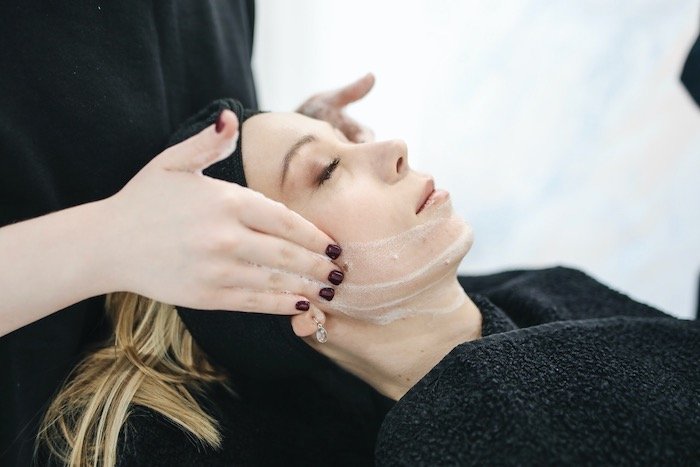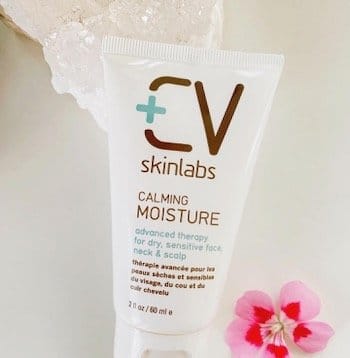
You probably trust that your moisturizer for sensitive skin is working for you.
But what if it’s not? What if instead of helping your skin, it’s harming it?
University of California San Francisco dermatology professor Peter Elias, M.D., who’s researched sensitive skin for 45 years, recently found that some creams and lotions can do more harm than good when it comes to caring for sensitive skin.
Moisturizer for Sensitive Skin Must Respect the Skin Barrier
At the very surface of the skin, called the outside layer or skin barrier, are dead skin cells that are surrounded by fats like cholesterol, ceramides, and fatty acids.
This outer barrier, according to Elias, is like a brick wall, protecting the skin and the rest of the body from outside assaults like UV rays, pollution, harsh weather, and dangerous microorganisms. When the barrier is healthy and strong, it not only protects the body from illness but also promotes healthy, smooth-looking skin.
When the skin barrier is damaged, however, it can develop cracks and spaces that allow damaging components in while letting water out, leaving skin dry, cracked, and irritated. Elias adds that while moisturizers help, it’s important that a good moisturizer contains the three fats mentioned (cholesterol, ceramides, and fatty acids) at approximately equal ratios.
If the moisturizer does not contain this unique blend, the “mortar” between the bricks will not get what it needs to fill in the spaces. “Then, instead of a brick wall,” Elias said in a press release, “you get this Swiss cheese, which is not what you want.”
 How Your Moisturizer for Sensitive Skin Could be Damaging the Skin Barrier
How Your Moisturizer for Sensitive Skin Could be Damaging the Skin Barrier
This “Swiss cheese” situation is interpreted by the body as an injury. That means it is likely to send immune cells to the site to fix the problem. That can create inflammation, which can lead to further skin barrier damage and dryness. In those with sensitive skin, this reaction can be even worse, with greater inflammation and irritation that doesn’t go away.
Most lotions help hydrate skin in the short-term. Where they differ is in their long-term effects. If they are not properly formulated—they have the wrong mix of “mortar” ingredients or they change the skin’s natural pH balance—they are unlikely to have lasting beneficial effects.
The skin barrier may be temporarily hydrated but then will return to its injured “Swiss cheese” state. This will inspire more inflammation and create a destructive cycle that leads to chronic skin damage, dryness, and potentially cracking and bleeding.
“We found that the great majority of moisturizers haven’t been tested on people with sensitive skin,” Elias said. “It induces a vicious cycle where the patient is applying material frequently for temporary relief but the result is long-term worsening of the skin.”
Relief for Dry, Sensitive Skin
The answer to this problem, according to what we know from research so far, is to find a moisturizer that contains the mortar ingredients in their proper proportions. Elias found in his studies that when the right moisturizer was used in those with sensitive skin, it helped to decrease inflammation, stopping the destructive cycle and helping the skin to heal.
Elias and colleagues are conducting additional studies to further examine this issue, to see if fixing the mortar in the skin may not only limit inflammation but create whole-body benefits such as the reduced risk of chronic diseases. The notion that repairing the skin barrier could lead to, say, a lower risk of cardiovascular disease, is a new one, but an interesting one for sure.
Meanwhile, you may wonder: What can I do to make sure my moisturizer is helping instead of hurting?
4 Signs Your Moisturizer for Sensitive Skin Isn’t Doing Its Job
To determine whether you have the right moisturizer for your sensitive skin, look for these signs.
 1. You Have to Reapply It Often
1. You Have to Reapply It Often
How long does your skin feel soft, comfortable, and hydrated after you apply your moisturizer? If it’s all day, you probably have the right one. If your skin feels dry an hour or two or even a few hours after applying the lotion, you probably have the wrong one.
Action: Change your moisturizer right away. Look for one that has a good mix of healthy fats. Our Calming Moisture, for instance, contains triglycerides, natural oils, and shea butter, giving your skin a healthy combination of various fats to help fill in those mortar-like spaces. And it was tested on those with sensitive skin!
2. Your Sensitive Skin is Dry and Irritated
The right moisturizer will help keep your sensitive skin hydrated and supple. If, when you look in the mirror, you see dry, irritated skin, your moisturizer is not doing its job. Also, if you find yourself scratching your skin throughout the day, that’s another sign you need to change your moisturizer.
Action: Remember that it’s not just your face that can suffer from dry, irritated skin. If you’re scratching in other places, try our Body Repair Lotion. Like our Calming Moisture, it contains triglycerides, natural oils, vitamin E, and shea butter. With these ingredients and more, it gives the skin what it needs to keep that outer barrier strong.
3. Your Skin Burns When You Apply Your Moisturizer
Any reaction like burning, stinging, or itching after putting on a moisturizer means that your skin is struggling with it. Ideally, your skin drinks up your moisturizer and looks and feels better afterward. If putting on your moisturizer is an uncomfortable experience, change your moisturizer right away.
Action: While you look for a new moisturizer, consider using our Rescue + Relief Spray to help calm and soothe your irritated skin. It contains aloe, cucumber, water lily, and valerian which work together to tame inflammation and cool skin. What a blessing after that other irritating product!
4. You’re Getting Little Bumps or Breakouts on Your Skin
Sensitive skin can react much more easily than normal skin. Put on the wrong moisturizer and you may break out, develop blackheads, or find little white bumps on your skin. These are all signs that the moisturizer is not what your skin needs. It may not be properly pH-balanced, may have ingredients that are harsh or harmful, or might encourage inflammation.
Action: Don’t feel like because you have sensitive skin, you have to settle for breakouts and bumps. That’s simply not true. When you give your skin what it needs to heal the skin barrier, you will notice improvements. And they don’t include pimples!
Choose a different moisturizer that works better for you, then consider what you’re using for a cleanser and toner too. It could be your entire skincare routine could use a makeover. Take it one step at a time until you notice improvements.
How does your skin react to your moisturizer?
Featured photo by Polina Tankilevitch from Pexels

